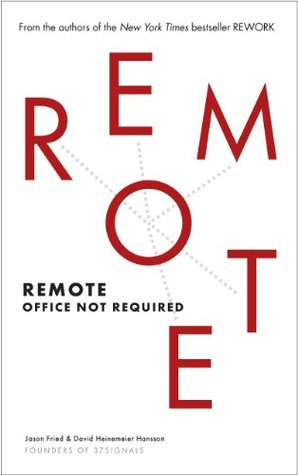More on this book
Community
Kindle Notes & Highlights
As a manager, you have to accept the fact that people will make mistakes, but not intentionally, and that mistakes are the price of learning and self-sufficiency.
In reality, it’s overwork, not underwork, that’s the real enemy in a successful remote-working environment.
If work is all-consuming, the worker is far more likely to burn out. This is true even if the person loves what he does. Perhaps especially if he loves what he does, since it won’t seem like a problem until it’s too late.
The scarcity of such face time in remote working situations makes it seem that much more valuable. And as a result, something interesting happens: people don’t waste the time.
Since most of us work remotely, we really value our occasional face time.
most people need some sort of routine
it can also be helpful to separate the clothes you wear, depending whether you’re in work or play mode.
demarcate the difference between work and play. Simply looking presentable is usually enough.
if you’re having trouble getting into work mode in the morning, try putting on some pants.
divide the day into chunks like Catch-up, Collaboration, and Serious Work.
Make sure that real work only happens when you’re in your dedicated home office.
simply reserve one computer for work and another for fun. This works doubly awesome if your fun device can’t even run the programs needed to do your real work.
This works even better if you hook it up to enough keyboard, mouse, and monitor wires to make it a real hassle to disconnect.
Think of that iPad as your sweatpants—perfect for lounging around the house, but not something you’d think of taking to the office.
the presence of other people, even if you don’t know them, can fool your mind into thinking that being productive is the only proper thing to do.
Motivation is the fuel of intellectual work. You can get several days’ worth of work completed in one motivation-turboed afternoon. Or, when you’re motivation starved, you can waste a week getting a day’s worth of work done.
the only reliable way to muster motivation is by encouraging people to work on the stuff they like and care about, with people they like and care about.
If a worker’s motivation is slumping, it’s probably because the work is weakly defined or appears pointless, or because others on the team are acting like tools.
Is the person bored with a project that’s not challenging enough, or are they feeling stuck and, in reaction, procrastinating to avoid a situation that feels impossible?
Motivation is pivotal to healthy lives and healthy companies. Make sure you’re minding it.
While nobody on their deathbed wishes they’d spent more time at the office, many sure do wish they’d spent more time with their family.
Imagine eating breakfast with the family without the stress, taking half an hour over lunch to play in the yard together, or being there for a sick child without missing a whole day of work.
When the walk to the office is literally five seconds, family folks can put in the hours with less guilt and less stress.
Remote work is here, and it’s here to stay. The only question is whether you’ll be part of the early adopters, the early majority, the late majority, or the laggards.


